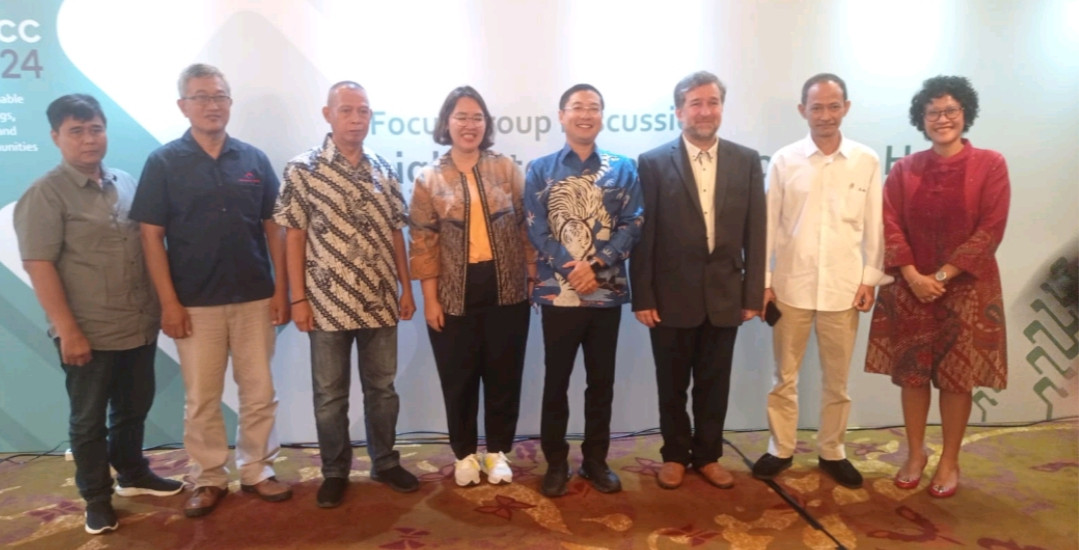Popular Reads
Top Results
Can't find what you're looking for?
View all search resultsPopular Reads
Top Results
Can't find what you're looking for?
View all search resultsAdvancing sustainable housing: The revolution in light steel modular homes
Change text size
Gift Premium Articles
to Anyone
T
he Sustainable Buildings, Cities and Communities (SBCC) community, in collaboration with the Indonesian Modular House Association (ARMI) and the Public Works and Housing Ministry, organized a focus group discussion (FGD) titled “Light steel-based modular houses: Eco-friendly, energy & cost efficient, strong, light, fast, cooler” at the Mulia Hotel in Jakarta on May 15. The event featured an esteemed international keynote speaker, associate professor Samad Sepasgzoar, a distinguished researcher recognized by The Australian as a top national researcher and ranked within the top 2 percent of researchers globally by Standard University, along with being one of the world's best reviewers by Publons, Web of Science. Samad delivered a thought-provoking presentation on future technology implications for reducing energy consumption in buildings.
Beta Paramita, the founder of the SBCC and associate professor of the Architecture Study Program at the Indonesian Education University (UPI), elucidated that the FGD aimed to outline pragmatic and structured steps to alleviate the environmental repercussions stemming from built environment development in Indonesia.
Citing a World Bank report, Beta highlighted the significant threat posed by urban heat islands (UHIs) in conjunction with climate change, particularly impacting the competitiveness, livability and inclusiveness of East Asian cities. She underscored the alarming reality that cities in Indonesia, Malaysia and the Philippines suffer the most from UHIs, with land surface temperatures up to 6.6 degrees celsius warmer than rural areas.
Moreover, Beta referenced data from the United Nations Environment Program (UNEP), indicating that 40 percent of energy consumption and approximately 30 percent of greenhouse gas emissions stem from the built environment, with housing development being a notable contributor. She emphasized that housing, as a diverse architectural typology, must adapt and evolve over time to accommodate changing needs and lifestyles, necessitating a critical and comprehensive approach to its role in the built environment.
In this context, modular homes have emerged as a dynamic design strategy revolutionizing conventional housing, offering versatile spatial solutions and sustainable construction practices. Beta traced the evolution of modular homes from prefabricated house catalogues in the 19th century to modern-day innovations, reflecting a commitment to a more environmentally friendly future.
Nicolas Kesuma, chair of the ARMI, expounded on the unique construction methodology of modular houses, wherein factory-assembled components like walls, windows, doors and roofs are assembled on-site, resulting in 50 percent faster construction and 50 percent less material usage compared with traditional methods. He emphasized the role of new technology in enabling the construction of larger, taller and more diverse modular buildings, showcasing the efficiency of modern techniques such as 3D digital modeling.
Highlighting the pressing need for housing construction in Indonesia, especially for low-income communities, Nicolas advocated for modular houses with light steel structures, citing their energy efficiency, cost-effectiveness, strength and environmental benefits. He emphasized the potential of the national steel industry to meet this demand while enhancing local content value (TKDN) and contributing to economic growth aligned with the UN’s Sustainable Development Goals (SDGs).
In conclusion, Nicolas underscored the importance of collaboration among stakeholders to advance sustainable housing solutions. The Public Works and Housing Ministry, through its Directorate General of Housing and Directorate General of Human Settlements, has outlined initiatives to address community housing needs, post-disaster reconstruction and the development of green and smart building prototypes. He emphasized the constructive dialogue among academics, industry experts and government representatives to pave the way for green and smart home prototypes that meet stringent standards and contribute to reducing greenhouse gas emissions.
Overall, the FGD served as a platform to foster communication, expand networks and chart a course toward environmentally friendly, energy-efficient, and socially inclusive housing solutions in Indonesia.
Your Opinion Matters
Share your experiences, suggestions, and any issues you've encountered on The Jakarta Post. We're here to listen.
Thank you
Thank you for sharing your thoughts. We appreciate your feedback.










